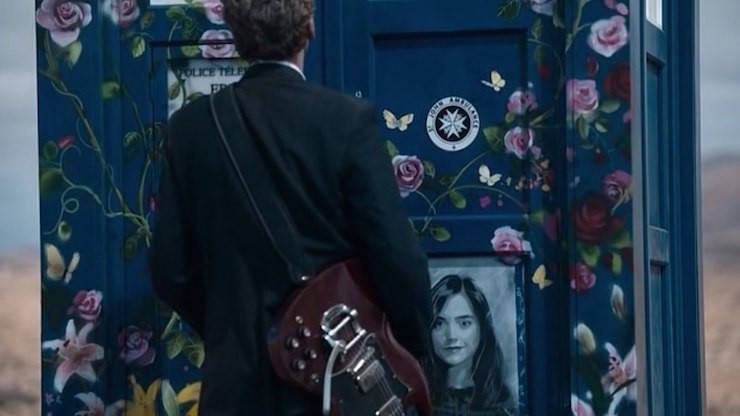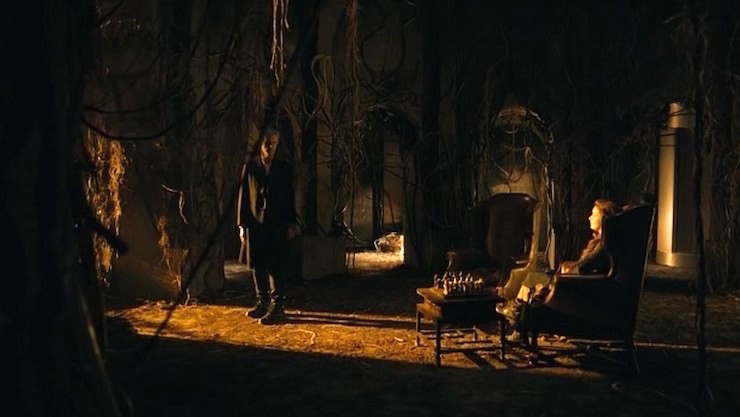We’ve reached the end of season 9 and, safe to say, it’s a season that will be remembered as one of the better in Doctor Who’s long history.
And what of its finale, “Hell Bent”?
Summary
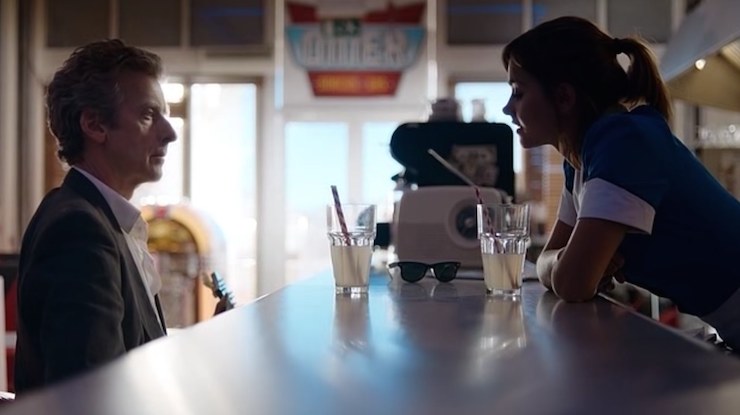
The Doctor enters the same ’50s-style diner in Nevada where he met Amy, Rory, and River in season 6. Working at the diner is a woman who appears to be Clara, but isn’t. The Doctor proceeds to tell this woman a story about his friend Clara. The episode then moves to Gallifrey, where the Doctor has just escaped the Confession Dial. He goes back to the barn (part of an orphanage?) that we saw in “Listen” and waits with the people there. The Lord President sends a military attachment, but the Doctor won’t speak to them. Then it sends the Council, and the Doctor still isn’t interested. Ohila, of the Sisterhood of Karn, tells the President that the Doctor blames him for the War and will only speak to him. When the President arrives, he orders the military contingent to shoot the Doctor, but they all miss; they consider the Doctor a war hero, and they refuse to harm him. The Doctor insists that the President (who is revealed to be Rassilon) leave the planet. He is exiled.
The Doctor finds out that he was trapped in the Confession Dial because there was concern that he might be the prophcized “hybrid,” and at the very least, he knew about it. The Doctor claims that he has information on it, but he needs Clara for that. So, he has the Time Lords extract her from the very end of her time stream, a split second before she dies; her biological functions are trapped in a time loop, so she isn’t aging, and she has no pulse, either. The General insists on explaining this situation to Clara, but the Doctor won’t allow it. It’s then that the General realizes that the Doctor did not extract Clara for information. The Doctor steals his gun and a neuro block, and demands that the General step aside. When he won’t, the Doctor confirms that he can still regenerate before shooting him dead, and running off with Clara into Cloisters, where the Matrix is housed. (It’s where the minds of dead Time Lords live on; the Confession Dials are actually meant to help a Time Lord sort out their business before being uploaded there.) The General regenerates into a woman, her preferred form.
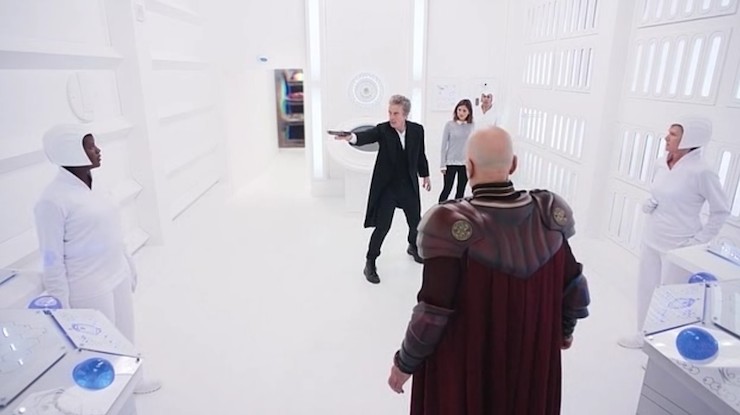
The Doctor leads Clara around the Cloisters, trying to avoid the Wraiths—invaders of different species that tried to break in and were caught by the Matrix. He’s trying to find the exit, and tells Clara of a Time Lord who escaped the Cloisters ages ago, though it left him mad; Clara knows the Doctor is talking about himself when they get into Missy’s tale about the moon and the President’s wife (who was actually his daughter, according to the Doctor). It turns out that the Doctor heard about the Hybrid prophecy in the Cloisters from the wraiths there, and this is what led him to steal a TARDIS and run away. The General and Ohira try to convince Clara to get the Doctor to tell them what he knows of the Hyrbid, explaining to her that he was trapped in the Confession Dial for around four-and-a-half billion years. Clara asks the Doctor why, and he admits that he did it to break through to Gallifrey and save her. Clara distracts the General and Ohira long enough for the Doctor to escape and steal another TARDIS, whisking her away moments later.
The Doctor takes Clara far away, hoping that if they get far enough he will break the time loop on Clara, and she will be safe and allowed to live again. Clara’s pulse stubbornly refuses to return. The Doctor travels to the very end of the universe (in time, not space), and hears four knocks on the door. It’s always four knocks, he tells Clara (and it was for the Master, for Wilf, back when he was Ten). He goes outside to meet Me, the very last of all the immortals left, watching everything burn out. They have a discussion about the Hybrid, and the Doctor posits that she is it, half-human, half-Mire, two warrior races. Me posits that the Doctor is the Hybrid, half-Gallifreyan, half-human perhaps. Then she suggests that the Doctor and Clara together are the Hybrid, pushing each other to terrifying extremes. The Doctor admits that he plans to use the neuro blocker he stole to wipe Clara’s memories of him, so he can bring her back to Earth without fear that the Time Lords will find her. Clara overhears their conversation and tells the Doctor that she won’t allow it; she’s reversed the polarity on the neuro blocker so it will backfire on him. She insists that her memories are hers to keep, and that he has no right to take them from her.
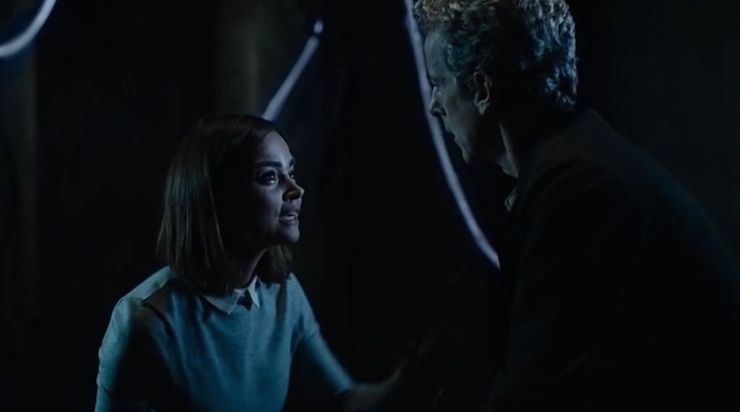
The Doctor isn’t sure he believes that Clara damaged the neuro blocker, but he tells her something must be done—he was willing to go too far to save her. Together, they agree to activate the neuro blocker, unsure of who will get their memories erased. It ends up wiping the Doctor’s memories of Clara. He wakes up in Nevada with no memory of her, and finds the diner. It turns out that the waitress he was telling the story to is truly Clara, but he cannot remember what she looks like, only the adventures they had together. The diner turns out to be the TARDIS the Doctor just stole from Gallifrey, and Clara and Me dematerialize the diner around the Doctor, leaving him with his own TARDIS (that still has Rigsy’s painted tribute to Clara on it). Clara intends to go back to Gallifrey and let the Time Lords restore her to her death, but seeing as she’s immortal and has a TARDIS, she and Me decide to get to Gallifrey the “long way around” and travel Time and Space together.
The Doctor enters his own TARDIS to find his old coat and the blackboard, which reads “Run you clever boy, and be a Doctor.” The TARDIS gifts him with a brand new sonic screwdriver, and the Doctor resumes his travels.
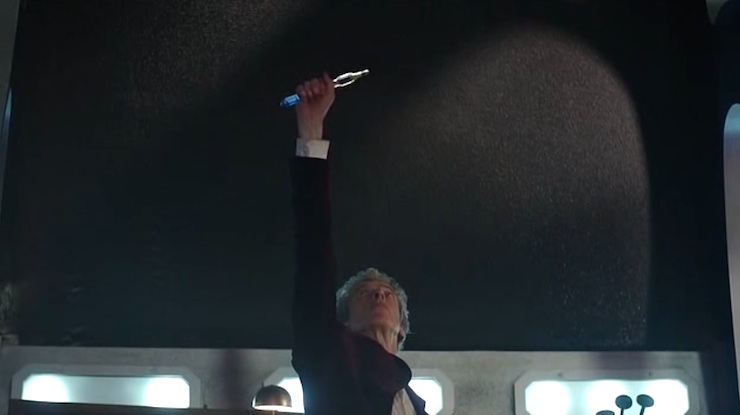
Commentary
That. Is how it’s done.
I’ve been screeching all weekend, I’m so happy.
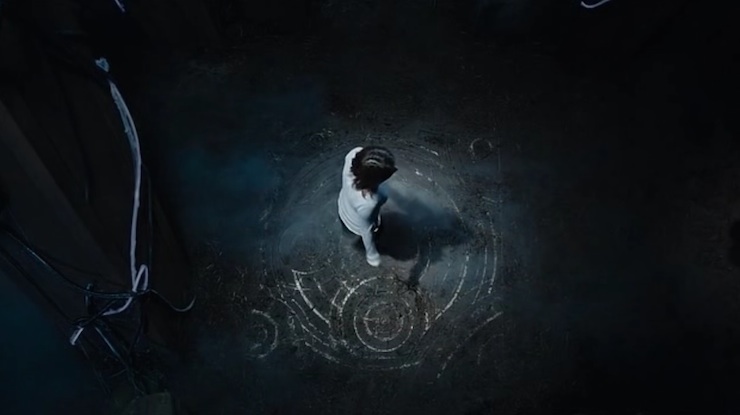
I mean, you can nitpick anything to death if you wanna, but this was easily one of the best season finales Doctor Who has ever produced. The Hybrid stuff was a little wonky and unresolved (my assumption is that it’s going to come back later), but this finale. Wow. This finale looked at the current legacy of the new show and tried to make something of it in every possible way.
So let’s start with the fact that I’m really happy that the Doctor didn’t go back to Gallifrey just to “bring it back.” This episode was a very clever way of using Gallifrey for the history it provides, giving little hints about the Doctor’s past, what he’s done and why, without needing to make it all about GALLIFREY in big capital letters. Exiling Rassilon is bound to bite someone in the butt later on down the road, but that can be a far-off thing, and doing it allowed the Doctor to finally place some of that rage he felt for everything that the Time War did to him. (Also, the fact the Rassilon’s not Timothy Dalton? Means that Simm Master totally iced him post-“The End of Time.” That is what I’m choosing to believe until I’m told otherwise. It makes sense that Missy is such a happy incarnation of the character if she got the chance to really take revenge on the guy who’s responsible for all her pain.)
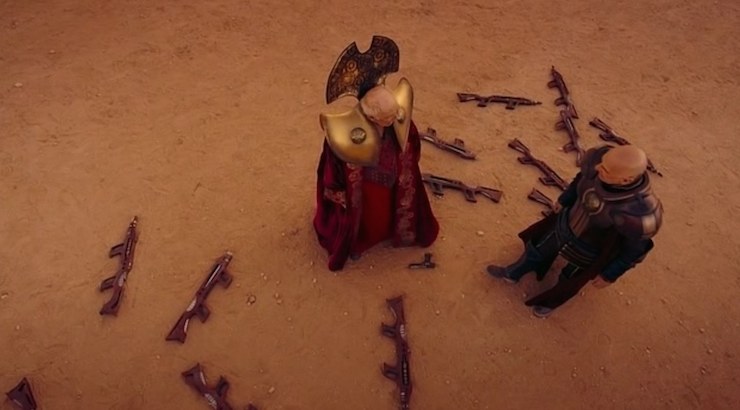
At first I was so concerned about pulling Clara out of her time stream, avoiding her death like so many fake-outs Moffat has given us in the past. But this? This was a best possible scenario for Clara—for any companion. All this gloom and doom surrounding her death is ultimately a season-long fake-out. I mean, it isn’t, she will still die precisely when she dies, but it also is. And that would seem like a cheat were it not for what Clara’s life means now. We know that Moffat didn’t plan this as far back as two seasons (Jenna Coleman hadn’t been sure that she was going to come back for season 9 initially), but it reads like the plan all along: Last season, Clara learned to be her own Doctor. This season, the newborn confidence she gained with that ability, emboldened by loss (of Danny), made her reckless and led to her death.
But as Clara says—the Doctor is allowed to be reckless all the time, so why can’t she be? And the answer that the show ultimately gives us is… there’s no good reason why. If Clara wants to become the Doctor, then she should be. And she should have a TARDIS, and an immortal companion, and have millions of years’ worth of adventures.
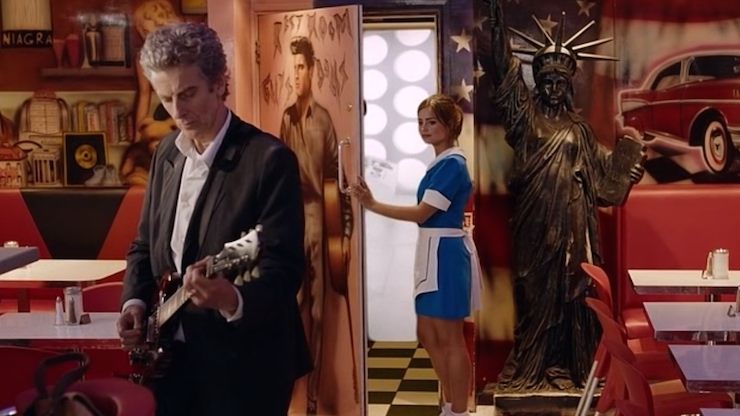
(Personal aside: I feel the need to point out that the Master keeps creating Doctors. The Doctor and the Master themselves are a feedback circle that kind of create each other, but Missy HAND-SELECTED Clara to be the Doctor’s companion, thereby creating another Doctor. It matters to me. For reasons.)
Seriously. Clara Oswald and Ashildr as time traveling non-monogamous girlfriends who save the universe in their ’50s diner. (They frequently pretend to be servers there to get interesting information out of people.) The series is called Clara and Me. (Get it? GET IT.) It’s actually happening out there somewhere, just make it real in front of my eyeballs. Give me show.
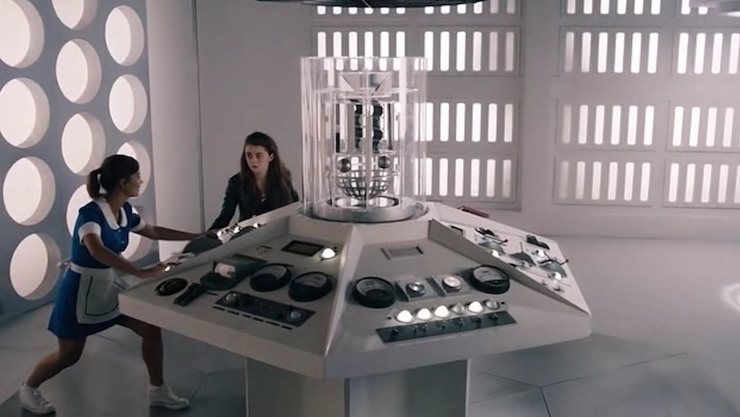
And still, it means more than that. Because fans were understandably upset at Donna’s departure, with the Tenth Doctor making a deeply important choice on her behalf and wiping her mind without her agreement. No one wanted Donna to die, but it still stung that she was never permitted the chance to make her own choice. And choice is precisely what Clara demands of the Doctor, with the acknowledgement that her experiences, her life, are her own. He is not permitted to save her just because it would make him happier. That acknowledgment forces the Doctor to come to terms with his own grief; Clara’s death was never the problem, his reaction to it was. He is the one making terrible decisions to save a friend who never asked to be rescued. Realizing that, it’s only fitting that he is the one who ends up shouldering the loss—and in this case, the loss is quite literal.
The Doctor loses Clara Oswald. He loses her face, her words, the space she took up in his life. And it’s sad for him, of course, but for Clara? She gets the greatest endgame a companion has ever managed, certainly among the new series counterparts. She gets to keep running, forever. And now that her best friend can no longer remember her, she has to change her tried-and-true farewell: “Run, you clever boy. And be a Doctor.”
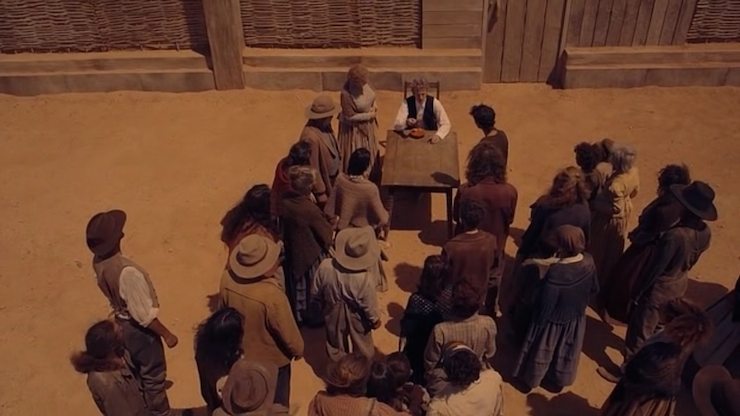
Murray Gold has been killing it this season in regards to the soundtrack, but this episode really brings it home. The Doctor playing Clara’s theme on his guitar was tear-inducing on my end, and the resurgence of Gold’s first Doctor theme, the one that we originally associated with Nine, brings the show back to its roots while he’s on Gallifrey.
The loose threads on this episode genuinely seem like set up for future events, even if they’re a long way off. There’s so much we don’t know, and so many characters and ideas that could be used going forward. (I want more Ohila. She’s the greatest. She is the best for calling the Doctor on his crap.) The Matrix has always been an interesting part of Time Lord society and was a great aspect to has out, the Cloister Wraiths are creepy as hell, the references to the Doctor’s childhood that never really get fleshed out, the truth about what the Hybrid is really supposed to mean. It was exciting to see a far more diverse population on Gallifrey than we’ve ever seen before.
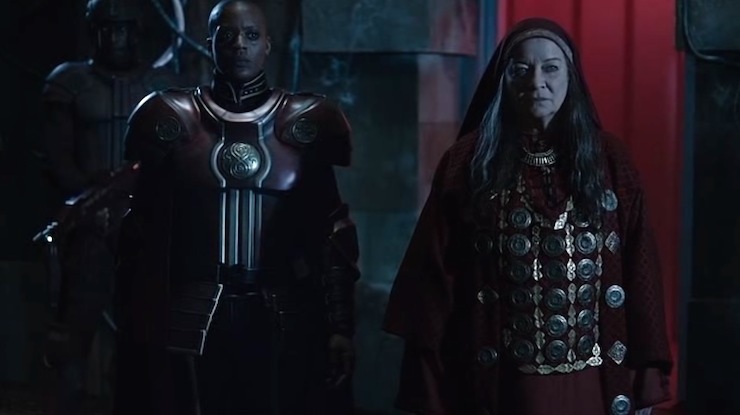
To that effect, the General’s regeneration (once you get past the HOLY SH*T THE DOCTOR JUST SHOT SOMEONE DEAD TO SAVE CLARA, WHOOOOAOAAAAA) is one of my very favorite things in the finale, both for how excellent the next incarnation is, and for what it suggests about switching genders for Time Lords. Her commentary in her new body is “Back to normal, am I?” and it gives us a whole fascinating potential spectrum for how Gallifreyan culture views gender, raising the idea that many Time Lords have a clear preference one way or the other, but that going back and forth between genders isn’t remotely a problem. (The soldier’s immediate switch from “sir” to “ma’am” where the General is concerned proves that while the change wasn’t expected, he wasn’t bothered by it.) From there we can ask so many questions, including whether or not there are Time Lords who frequently swap genders, but more importantly, it gives us a solid reason why the Doctor has never been a woman before—male is just a baseline. (And now I’m wondering if your “base gender” has to do with your assignation at birth for most Gallifreyans? So many questions….)
In addition, we have now witnessed a regeneration where a Time Lord goes from white person to a black person. (Romana showed that it was possible to also come out looking a different species, which raises far more odd questions. On the other hand, that sequence that isn’t well thought of since Douglas Adams depicts her potentially throwing regenerations away like discarded clothes until she finds one that she likes the look of.) It seems unlikely that skin color was part of what the General meant when she said “back to normal”—though she may normally have dark skin as well—since she immediately makes a qualifying comment wondering about how her peers were able to stand her former ego. Which suggests that skin color is not a fraught topic among Gallifreyans… and that would make sense, seeing as the lines of privilege seem to run more along who is a Time Lord and who is just a regular Gallifreyan.
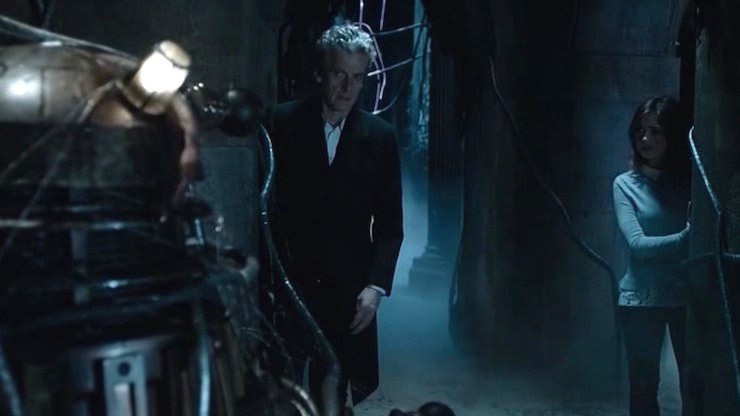
Aaahhhh, so many thoughts! So many questions! So much good fodder for bar talk with tipsy friends.
In the end, we get our hearts broken all over again, watching the Doctor stare at Clara Oswald and not see her. He’s left with a brand-new screwdriver and his proper Doctor coat, but he needs someone again. And that makes this finale quite special—it is simultaneously full of excitement and pain. We get to be glad for Clara and Me, and so sorry for the Doctor. But in the end, Clara wasn’t punished for what she wanted, and the Doctor learned something valuable indeed.
(Pro tip: Go back and watch that first scene again, now that you know what’s happening. At first, you might have thought that it was a different iteration of Clara who didn’t know him, and it seems like Twelve is trying not to let on. And then you watch it again and realize that the Doctor knows something is special about this women, and simply can’t place it. It’s so much worse.)
And the trailer for the Christmas special looks likes so. much. fun. Fingers crossed. I want an episode with River Song I can get behind.
Emmet Asher-Perrin is gonna spend the rest of the week thinking about Clara and Me in their ridiculous diner TARDIS. You can bug her on Twitter and Tumblr, and read more of her work here and elsewhere.










